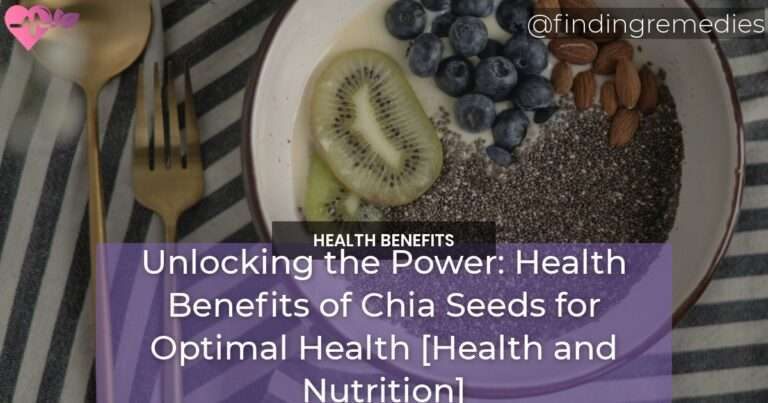Chia seeds are quickly becoming a popular dietary supplement among health-conscious individuals. And for good reason! Chia seeds are a great source of omega-3 fatty acids, fiber, and protein, making them a powerful health food. In addition to these basic benefits, they can also help reduce inflammation, regulate blood sugar, and support digestive health. But what are the specific health benefits of chia seeds?
In this article, we’ll be exploring the many ways chia seeds can help you achieve optimal health. We’ll discuss the nutritional value of chia seeds, as well as how they can help improve your cardiovascular health and boost your immune system. We’ll also discuss how to incorporate them into your diet and other ways to get the most out of these nutritional powerhouses. So, if you’re looking for a simple, natural way to improve your health, read on to learn more about the amazing benefits of chia seeds.
Table of Contents
Introduction
Chia seeds have recently gained a reputation as a superfood due to their numerous health benefits. They are small black and white seeds that come from the Salvia Hispanica plant, which is a member of the mint family. Chia seeds were once a staple food of the ancient Aztec and Mayan civilizations.
Nutritional Profile of Chia Seeds
Chia seeds pack a powerful nutritional punch. Here’s what you’ll find in just one ounce (28 grams) of chia seeds:
- 137 calories
- 4.7 grams of protein
- 8.6 grams of fat (mostly omega-3 fatty acids)
- 12 grams of carbohydrate (11 of which are fiber)
- Calcium, phosphorus, magnesium, and manganese
- Vitamins B1, B2, and B3
Natural Compounds in Chia Seeds
Chia seeds are rich in several natural compounds, including:
Omega-3 Fatty Acids
Chia seeds are one of the best plant-based sources of omega-3 fatty acids, which are essential for heart health, brain function, and reducing inflammation.
Antioxidants
Chia seeds are also packed with antioxidants, which help protect your body from damage caused by free radicals.
Phytochemicals
Phytochemicals are compounds found in plants that have health-promoting properties. Chia seeds contain several phytochemicals, including quercetin, kaempferol, and myricetin.
Health Benefits of Chia Seeds
Here are some of the top health benefits of chia seeds:
Improved Heart Health
Chia seeds can help improve heart health by lowering blood pressure, reducing inflammation, and lowering LDL (bad) cholesterol.
Lowered Blood Pressure
Chia seeds are rich in potassium, which can help lower blood pressure and reduce the risk of stroke.
Regulated Blood Sugar Levels
Chia seeds can help regulate blood sugar levels by slowing down the absorption of glucose.
Reduced Inflammation
Chia seeds contain several anti-inflammatory compounds that can help reduce inflammation in the body.
Improved Digestive Health
The high fiber content in chia seeds can help improve digestive health and prevent constipation.
Weight Loss and Management
Chia seeds can help with weight loss and management by keeping you feeling fuller for longer and reducing hunger cravings.
Effects of Cooking and Proper Storage
To retain the nutritional value of chia seeds, it’s best to store them in an airtight container in a cool, dry place. When cooking with chia seeds, it’s important to remember that they absorb liquid, so you may need to adjust the amount of liquid in your recipe.
Risks and Disadvantages
While chia seeds are generally safe to consume, there are some potential risks and disadvantages to be aware of, including:
Digestive Issues
Consuming too many chia seeds can cause digestive issues such as bloating, gas, and diarrhea.
Allergic Reactions
Some people may be allergic to chia seeds and experience symptoms such as hives or difficulty breathing.
Interaction with Medications
Chia seeds may interact with certain medications, so it’s important to talk to your doctor before adding them to your diet.
Varieties and Types of Chia Seeds
There are several different types of chia seeds available, including black and white varieties. While the nutritional content is fairly similar between the different types, some people prefer the taste and texture of one over the other.
Healing Diseases with Chia Seeds
Chia seeds may have therapeutic benefits for certain health conditions, including:
Type 2 Diabetes
Chia seeds can help regulate blood sugar levels and reduce insulin resistance in people with type 2 diabetes.
Cardiovascular Diseases
The omega-3 fatty acids in chia seeds can help improve heart health and reduce the risk of cardiovascular disease.
In conclusion, chia seeds are a highly nutritious superfood that offer numerous health benefits. Incorporating them into your diet can help improve heart health, regulate blood sugar levels, reduce inflammation, and aid in weight loss and management. Just be sure to store and prepare them properly and be aware of any potential risks or interactions.
Resources
- 1. Chicco AG, D’Alessandro ME, Hein GJ, Oliva ME, Lombardo YB. Dietary chia seed (Salvia hispanica L.) rich in alpha-linolenic acid improves adiposity and normalises hypertriacylglycerolaemia and insulin resistance in dyslipaemic rats. Br J Nutr. 2009 Jun;101(11): 41-50.
- 2. Toscano LT, da Silva CS, Toscano LT, de Almeida AE, Santos AS, Silva AS, Silva Lde A, de Brito NJ, Boa-Sorte NC, de Oliveira Lopes MV. Chia flour supplementation reduces blood pressure in hypertensive subjects. Plant Foods Hum Nutr. 2014 Dec;69(4):392-8.
- 3. Valdivieso-Ugarte M, Vega-Gálvez A, Miranda M, López J, Pérez-Won M. Effect of drying temperature on the physicochemical properties, antioxidant capacity, and total phenolic content of chia seeds (Salvia hispanica L.). J Food Sci. 2015 Aug;80(8):C1667-72.

